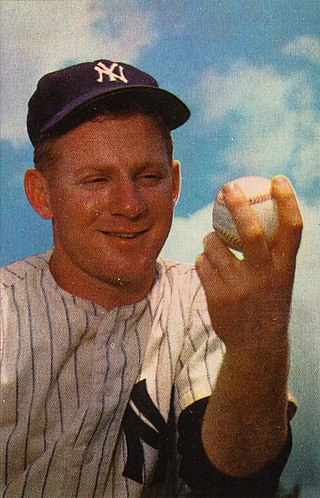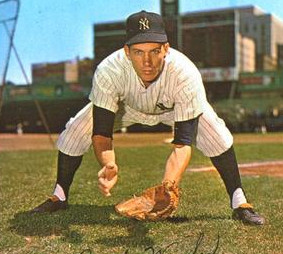Related Research Articles

Lawrence Peter "Yogi" Berra was an American professional baseball catcher who later took on the roles of manager and coach. He played 19 seasons in Major League Baseball (MLB), all but the last for the New York Yankees. He was an 18-time All-Star and won 10 World Series championships as a player—more than any other player in MLB history. Berra had a career batting average of .285, while hitting 358 home runs and 1,430 runs batted in. He is one of only six players to win the American League Most Valuable Player Award three times. He is widely regarded as one of the greatest catchers in baseball history and was elected to the Baseball Hall of Fame in 1972.

Mickey Charles Mantle, nicknamed "the Mick" and "the Commerce Comet", was an American professional baseball player who played his entire Major League Baseball (MLB) career (1951–1968) with the New York Yankees, primarily as a center fielder. Mantle is regarded by many as being one of the best players and sluggers of all time. He was an American League (AL) Most Valuable Player three times and was inducted into the Baseball Hall of Fame in 1974.

Edwin Donald "Duke" Snider, nicknamed "the Duke of Flatbush", was an American professional baseball player. Primarily a center fielder, he spent most of his Major League Baseball (MLB) career playing for the Brooklyn/Los Angeles Dodgers (1947–1962), later playing one season each for the New York Mets (1963) and San Francisco Giants (1964).

Edward Charles "Whitey" Ford, nicknamed "the Chairman of the Board", was an American professional baseball pitcher who played his entire 16-year Major League Baseball (MLB) career with the New York Yankees. He was a 10-time All-Star and six-time World Series champion. In 1961, he won both the Cy Young Award and World Series Most Valuable Player Award. Ford led the American League (AL) in wins three times and in earned run average twice. He is the Yankees franchise leader in career wins (236), shutouts (45), innings pitched, and games started by a pitcher. Ford was inducted into the Baseball Hall of Fame in 1974.

The 1960 World Series was the championship series of Major League Baseball's (MLB) 1960 season. The 57th edition of the World Series, it was a best-of-seven playoff that matched the National League (NL) champion Pittsburgh Pirates against the American League (AL) champion New York Yankees. In Game 7, Bill Mazeroski hit the series winning ninth-inning home run, the first time a winner-take-all World Series game ended with a home run, and the first World Series to end on a home run. Mazeroski's home run gave the Pirates their third title overall and their first since 1925.
The 1964 World Series was the championship series of Major League Baseball's (MLB) 1964 season. The 61st edition of the World Series, it was a best-of-seven playoff that matched the National League champion St. Louis Cardinals against the American League champion New York Yankees; the Cardinals prevailed in seven games. St. Louis won their seventh world championship, while the Yankees, who had appeared in 14 of 16 World Series since 1949, did not play in the Series again until 1976.

The 1952 World Series featured the 3-time defending champions New York Yankees beating the Brooklyn Dodgers in seven games. The Yankees won their 4th consecutive title, tying the mark they set in 1936–1939 under manager Joe McCarthy, and Casey Stengel became the second manager in Major League history with 4 consecutive World Series championships. This was the Yankees' 15th World Series championship win, and the 3rd time they defeated the Dodgers in 6 years.

The 1951 World Series matched the two-time defending champion New York Yankees against the New York Giants, who had won the National League pennant in a thrilling three-game playoff with the Brooklyn Dodgers on the legendary home run by Bobby Thomson.

The 1953 World Series was the championship series in Major League Baseball for the 1953 season. The 50th edition of the World Series, it was a best-of-seven playoff that matched the American League (AL) champion and four-time defending World Series champion New York Yankees against the National League (NL) champion Brooklyn Dodgers in a rematch of the 1952 Series, and the fourth such matchup between the two teams in the past seven seasons. The Yankees won in six games for their fifth consecutive title—a mark which has not been equalled—and their 16th overall. It was also the last of seven consecutive World Series wins by teams from the American League, the longest such streak for the AL in series history. Billy Martin won World Series MVP honors as he hit .500 with a record-tying 12 hits and a walk-off RBI single in Game 6.

The 1955 World Series was the championship series of Major League Baseball's (MLB) 1955 season. The 52nd edition of the World Series, it was a best-of-seven playoff that matched the National League (NL) champion Brooklyn Dodgers against the American League (AL) champion New York Yankees, with the Dodgers winning the Series in seven games to capture their first championship in franchise history. It would be the only Series the Dodgers won while based in Brooklyn, as the team relocated to Los Angeles after the 1957 season. This was the fifth time in nine years that the Yankees and the Dodgers met in the World Series, with the Yankees having won in 1947, 1949, 1952, and 1953; the Yankees would also win in the 1956 rematch.
Terry Cashman is an American record producer and singer-songwriter, best known for his 1981 hit, "Talkin' Baseball". While the song is well recognized today and allowed Cashman the chance to meet the featured players, it was all but ignored by typical Top 40 radio during its chart life, making only the Billboard Adult Contemporary chart.

Philip Francis Linz was an American professional baseball player. Linz played in Major League Baseball for the New York Yankees (1962–65), Philadelphia Phillies (1966–67), and New York Mets (1967–68). He batted and threw right-handed, and was listed at 6 feet (72 in) and 180 pounds (82 kg), during his playing days.

Cletis Leroy "Clete" Boyer was an American professional baseball third baseman — who occasionally played shortstop and second base — in Major League Baseball (MLB) for the Kansas City Athletics (1955–57), New York Yankees (1959–66), and Atlanta Braves (1967–71). Boyer also spent four seasons with the Taiyō Whales of Nippon Professional Baseball (NPB). In his 16-year big league career, Boyer hit 162 home runs, with 654 runs batted in (RBI), and a .242 batting average, in 1,725 games played.
Yankeeography is a biography-style television program that chronicles the lives and careers of the players, coaches, and other notable personnel associated with the New York Yankees Major League Baseball team. The series is aired on the YES Network and is produced by MLB Productions. The series is hosted by Yankees radio personality John Sterling. The series has earned five New York Sports Emmy Awards since its inception. In addition to airing on YES, MLB Productions has packaged many of the shows into DVD boxed sets.

Henry Roy Hamey was an American front-office executive in Major League Baseball (MLB). A longtime employee of the New York Yankees, he was appointed the club's general manager in November 1960. Inheriting a pennant-winner from his predecessor, George Weiss, he maintained the Yankees' dominant position in MLB by producing three additional American League champions and two World Series champions in three full seasons before retiring in the autumn of 1963. Hamey also spent nine years as the general manager of two National League franchises, the Pittsburgh Pirates and Philadelphia Phillies, during the period between 1947 and 1958.

Baseball's Greatest Hits is the name of two different CD collections of songs and other recordings connected with baseball, released in 1989.
The 1964 major league baseball season began on April 13, 1964. The regular season ended on October 4, with the St. Louis Cardinals and New York Yankees as the regular season champions of the National League and American League, respectively. The postseason began with Game 1 of the 60th World Series on October 7 and ended with Game 7 on October 15. In the fifth iteration of this World Series matchup, the Cardinals defeated the Yankees, four games to three, capturing their seventh championship in franchise history, since their previous in 1946. As of 2024, the Cardinals are the only National League team to have an edge over the Yankees in series played (3–2), despite holding a losing record in World Series games against them (13–15).

On October 8, 1956, in Game 5 of the 1956 World Series, pitcher Don Larsen of the New York Yankees threw a perfect game against the Brooklyn Dodgers at Yankee Stadium. It was the only no-hitter in World Series history until the Houston Astros pitching staff of Cristian Javier, Bryan Abreu, Rafael Montero and Ryan Pressly threw a combined no-hitter in the 2022 World Series against the Philadelphia Phillies. It remains the only perfect game in the history of the World Series.

The Harmonica Incident took place on a New York Yankees team bus on August 20, 1964, en route to O'Hare International Airport. Infielder Phil Linz, slightly resentful at not being played during a four-game sweep by the Chicago White Sox that was believed at the time to have seriously set back the Yankees' chances at that year's American League pennant, began playing a harmonica in the back of the bus. Manager Yogi Berra, feeling that Linz's behavior was inappropriate given the team's recent poor performance, angrily called on him to stop, whereupon Linz threw the harmonica and loudly complained about being singled out despite not having been at fault for the losses.
The Willie, Mickey and the Duke Award is presented annually by the New York chapter of the Baseball Writers' Association of America to a group of players, or a specific team, who are linked together by a single event or common attribute in baseball history.
References
- ↑ Hall of Fame to honor Terry Cashman
- ↑ ESPN Page 2 article on Cashman
- ↑ ""It's Always Sunny in Philadelphia" the Gang Beats Boggs (TV Episode 2015) - IMDb". IMDb .
- ↑ Talkin' Baseball Songfacts
- ↑ Whitburn, Joel (2002). Top Adult Contemporary: 1961-2001. Record Research. p. 50.
- ↑ "Terry Cashman: Adult Contemporary chart history". Billboard. Retrieved 23 May 2023.